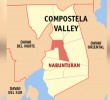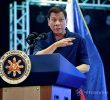THERE’S no question that the people’s war waged in the countryside alongside the revolutionary mass movements in the urban areas is leveling up to advanced stages and has taken deeper and deeper roots among the broad masses of the people. The toiling masses of workers, peasants and indigenous peoples, together with the patriotic youths and students and other progressive sectors and individuals in the cities have militantly supported and rallied behind the revolutionary actions waged by the armed revolutionaries against the reactionary forces of the government. But the fascist military commanders of the Aquino government keep on spitting lies to the sky even if their sputum splatters on their faces as they repeatedly brag that the forces of the NPA are diminishing.
The fascist officers and commanders of the AFP should be advised that instead of stubbornly pursuing their deceitful Oplan Bayanihan activities in the guise of peace and development programs, they had better go after the narcotic drug lords and traffickers. It is the illegal drug trade that is the real social menace — that is dragging the nation to damnation. It emasculates the moral strength and integrity of the nation’s young children. It is the most virulent pest gnawing at the socio-politico-moral fiber of our society. All of society’s conceivable and imaginable crimes practically proceed from the drug menace. Robberies, thefts, rapes, homicides, murders, massacres in their most shocking forms ever invented in the history of Philippine gangsterism are perpetrated with impunity in the streets as much as in the sanctuary of public offices in high places. All of these arise from crime syndicates associated with illegal drug trafficking. .
No less than the entire government machinery and the full force of the armed security forces of the State ought to be harnessed for the total extermination of this social menace. But State officialdom— politicians, bureaucrats, and military officers alike—abet its flourish for obvious personal gain. And they point to rebels as a convenient scapegoat and blame the communist insurgency as the principal agent of discord.
The Insurgency— which should be better called people’s war—is not the problem. On the contrary, it is the solution to the omnibus problem of the Filipino people. It is the only social phenomenon that guarantees liberation of Philippine society from the scourges of age-old poverty and underdevelopment. As a matter of fact, the economic well-being of the peasant masses and the indigenous peoples within the guerrilla zones maintained by the CPP-NPA is effectively addressed with the implementation of genuine agrarian reform. What transpires in the areas controlled and maintained by the revolutionary forces of the CPP-NPA is the microcosm of the future national democratic society to be put up after victory is won in the ongoing revolutionary struggle.
If it is really within the capability of the prevailing system of government to solve the problems of Philippine society, it could have done so a long time ago. Poverty and underdevelopment should have been a thing of the past. Sixty eight years—from the birth of the Philippine Republic in 1946 up to the present—is a long long time. What has caused the failure of the government from the time of Manuel A Roxas until the present to liberate the Filipino nation from the socio-economic morass it has sunk into? One wonders—is the government run by leaders who lack brains required of a pilot to direct the Ship of State to national progress?
Experience is supposed to be the ‘best teacher’, as the adage tells us. But the Philippine experience is a manifest show of failure by the prevailing system of government in bringing about progress and prosperity. It has been the worst negative teacher to the national leadership of our republic. Or rather, the long experience of manning the Philippine States has been one of anomalous, if not an entirely bizarre , tutorial experience. Why so? Because the Filipino leaders who have hitherto been schooled by their colonial teachers have been educated on a premise of puppetry that derives sustenance from corruption and self-aggrandizement rather than being inspired and motivated by the ideals of nationalism and the paramount interest and welfare of the citizenry.
And from what class or sector are these so-called national leaders from? Always from the big landlord and big comprador-capitalist classes. Always they fail in governance. But always they brilliantly succeed in amassing wealth themselves while in office.
The State bureaucracy has become a watering hole that provides for them grand opportunities for further enrichment. Verily, the public office is a business office within whose walls secret deals in the nature of business contracts are made to the neglect of the public good. It is a public trust only in the sense that the official considers himself entrusted with the function of contriving most cleverly the ways of gaining personal wealth. The public good is consigned to the devious advertising skills of deception and cajolery.
But, who are the puppeteers?—one might ask. It’s the American imperialists—so were they during the presidency of Roxas, so have they been through all the subsequent presidencies until the present regime of President Noynoy Aquino. They have continuously enjoyed the bounties of our mineral resources, directing the economic, political and cultural policies of the Philippine puppet government at the expense of the Filipino people. Their main interests have been to perpetuate the system of puppetry in our political system. And unless this rotten system whereby the few pseudo-leaders shine as illustrious puppets in scornful hoodwink of true statesmanship, the gaping divide between the few rich and powerful vis-à-vis the great majority of the masses in dire poverty will remain.
The sole hope for the people’s liberation from the bondage of deprivation and misery is the victory of the national democratic revolution now steadily advancing in the countryside. It is determined to win victory and to establish a genuine people’s republic that will insure economic uplift of the masses and push forward Philippine society to development and progress. The major features of its overall program includes a thoroughgoing agrarian reform and a nationalist industrialization. Under the guiding ideal of national democracy with socialism as egalitarian basis for societal reconstruction the people shall enjoy the fruits of development and progress under an atmosphere of national freedom and social justice.










